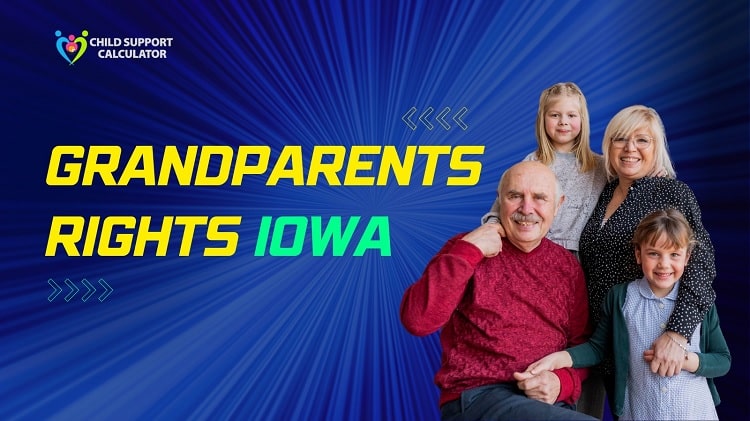Grandparents Rights In Oklahoma
Grandparents have an important role in the lives of many youngsters. When parents divorce or split, the connection between both parents and their in-laws might become tense. This stress frequently interferes with a child’s ability to see his or her grandparents.

Grandparents who desire to spend time with their grandkids despite their parents’ wishes may be able to do so legally. Grandparents’ rights are recognised in many states, but it’s crucial to know the specific requirements for when and how visitation can take place in yours.
Grandparent rights in Oklahoma are discussed in this article. If you have any questions after reading this material, seek legal guidance from a competent family law professional.
Grandparent Visitation Rights In Oklahoma
In Oklahoma, grandparents have visitation rights, but they are secondary to and cannot interfere with a parent’s custody rights. A judge’s first goal in any custody case is to keep the parent-child relationship intact.
Based on Troxel, the Oklahoma Supreme Court declared an earlier version of the Oklahoma Grandparent Visitation Statute invalid. The current revised statute has weathered legal challenges and now permits grandparents to visit their grandchildren if three conditions are met:
- Grandparent visitation is in the best interests of the child.
- Grandparent visitation is not allowed because the grandchild’s parent(s) are unsuitable or the grandchild would be harmed if it were.
- Circumstances have disintegrated the nuclear family unit of the grandchild, including:
- The grandparent’s relationship with the grandchild precedes the divorce, annulment, or maintenance action filed by the grandchild’s parents, and the grandparent’s relationship with the grandchild before the divorce, annulment, or maintenance action filed by the grandchild’s parents.
- The grandparents’ parents are either divorced or separated, or their marriage has been annulled.
- The grandparent’s child, the grandchild’s parent, has passed away, and the grandparent’s bond with the grandchild precedes the parent’s death.
- The grandchild was given to someone other than a parent, or the grandchild does not live with either parent.
- One or both of the grandparent’s parents have been convicted of a felony and are currently incarcerated, and the grandparent had a relationship with the grandchild prior to the parent’s incarceration.
- Whether court-ordered or not, the grandmother held custody of the child at some point.
- The grandparent has a deep bond with the grandchild, and the grandparent’s parent abandoned the other parent for at least a year.
- The grandparent’s parents have never married, do not live together, and have had a strong, ongoing contact with the grandchild.
For a grandparent to be granted court-ordered visiting privileges, all three components must be present. In one Oklahoma case, for example, the court refused a paternal grandparents’ request for visitation because only one of the three statutory conditions was met. In a divorce proceeding, the child’s father was identified as the non-custodial parent, and he wanted the child’s grandparents, his parents, to have more visitation.
Because neither parent was unfit, the child was not in danger, and there was no proof that obligatory grandmother visitation served the child’s best interests, the court refused to give grandparent visiting privileges.
In another Oklahoma instance, a court granted visitation to a paternal grandmother. In this case, visitation was appropriate because the grandmother had a strong, ongoing relationship with the child and the child’s parents had never married, thus there was never a nuclear family.
Furthermore, the grandmother’s son (and the child’s father) had died, and the child’s mother had just lately developed any kind of relationship with him. Despite the fact that the statute’s technical requirements were not met, the court concluded that grandparent contact was in the child’s best interests and in accordance with the statute’s spirit.
Grandparent Custody Rights In Oklahoma
In a nutshell, when a parent is ruled unsuitable, a court can grant grandparent custody of a grandchild. A lower court’s judgment granting maternal grandparents custody of their grandchild was overturned in one Oklahoma case.
The child’s mother had died, but the child’s natural father had applied for custody. The father was given custody of the granddaughter by a higher court because, despite not having previously been involved in the child’s life, he was a fit and proper parent. The rights of a grandparent to custody and visitation with a grandchild are always subordinate to the rights of a parent.
There are a few steps you must follow in order to become a guardian for your grandchild. The grandparent custody process starts with you filing a petition with the appropriate court, requesting guardianship of your grandchild.
That petition should include facts about the child, including where and with whom the child has been living, why you are seeking guardianship, the parents’ circumstances, and whether the children have military or Native American ancestry.
A home study may be required before the court decides whether or not to award you guardianship. A home study is an inquiry carried out by a professional social worker to assess whether the proposed guardianship is suitable.
The judge may, however, disregard this rule in circumstances involving family members. Before a court may designate you as a guardian of a minor, you must pass rigorous background checks.
Finally, the court will hold a guardianship hearing during which all parties involved can provide evidence. The judge will decide whether or not to grant the petition at the conclusion of the hearing. The judge may require you to return to court for review or inventory hearings in a few months or a year to see how the guardianship is progressing.
Grandparent Visitation Rights After Adoption In Oklahoma
Adoptive parents have no need to keep or allow contact between their kids and any biological relatives, including grandparents. When adoptive couples and biological families enter into their own visitation arrangements, there are several exceptions. Families should adhere to the conditions of a visitation agreement if one exists.
So, if a grandchild is adopted by a stepparent, what happens next? Is it possible for a grandmother to request visitation? Yes, as long as visitation is in the kid’s best interests, the child would suffer harm if visitation did not take place, and the child’s nuclear family unit has been broken.
In one Oklahoma case, however, it was emphasised that grandparents who have no biological tie to the grandchildren adopted by a stepparent cannot get court-ordered visitation. In other words, a grandparent may be permitted to request visitation with grandchildren adopted by their own kid, but not with grandchildren adopted by a spouse.
A grandparent may feel driven to intervene when their grandkids are in distress. It’s critical to know your rights if you’re a grandmother seeking visitation or custody of your grandchildren. If you have any additional questions about grandparent visitation rights in Oklahoma, you should get legal guidance from a local family law attorney.
FAQs
Grandparents do not have any rights to visitation with their grandchildren that are recognised by the law. Rather, those rights belong to a grandchild’s biological or adoptive parents, and grandparents can only visit in limited circumstances
A grandparent who wants to visit rights from the court must file a petition in the state district court. If the kid is already involved in a court matter, the petition should be filed in the same court that is handling that case.
First, the Court must decide if visitation with the grandparents is in the children’s best interests. The grandparent must next prove parental unfitness OR show that the children would suffer or be at risk of suffering harm if visitation rights were not granted to the children’s grandparents.
The answer to the above question is contingent on the rights sought by the grandparents and the parental status of the minor children. Grandparents in Oklahoma may be granted visitation with their grandchildren, serve as foster parents for their grandchildren, seek guardianship of their grandchildren, or seek to become adoptive parents of their grandchildren, depending on the circumstances.
Yes, but the party requesting modification or termination of visitation must file a Motion to Modify in District Court. If the original grandparent visitation was based on an Agreed Visitation Order, the party requesting to modify must demonstrate that circumstances have changed and that the modification or termination of the visitation is in the best interests of the child.
Yes. A guardianship may be required because of a parent’s health, military obligations that necessitate the parent to be out of the country, school enrollment, or parental unfitness. A guardianship can be awarded the consent of the parents, or it can be given against the parents’ objections if it is in the best interests of the child. A guardianship can have far-reaching consequences, therefore it’s crucial to consult an attorney before proceeding.







